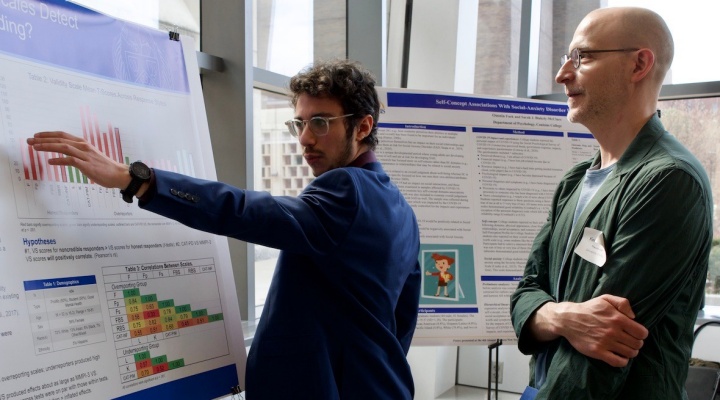
UB student Omeed Tartak is presenting his poster to faculty judge Dr. Ken DeMarree at the 4th annual Western New York Undergraduate Psychology Conference.
In this Issue:
Support your Department
Dear UB Psychology Friends,
It’s been a beautiful, if somewhat rainy, fall season in Western New York, and it’s hard to believe that it’s already time to start thinking about the end of the semester and the holiday season. As we wind down 2023, we are delighted to share some of the Department’s past successes and future hopes.
This has been a year of incredible growth for our department, and we’re looking forward to even more growth in the coming year! Last year we welcomed Dr. Federica Bulgarelli to our department. Dr. Bulgarelli’s research focuses on how language develops in early childhood, and her recent work has examined language development during the COVID-19 pandemic. You can read more about this interesting research – and the work of several other Psychology faculty members – in this newsletter. We also are in the midst of a search for three new faculty members. These hires are part of a Disciplinary Excellence investment in the Psychology Department by UB’s Provost. These three faculty will join the department and help to build expertise in studying disparities in mental health and well-being across the lifespan.
In the classroom, through experiential learning opportunities such as working in research labs and through involvement in clubs, activities, and independent Honors projects, our more than 1500 undergraduate Psychology majors are gaining important experience in the field. UB’s “Model Chapter” of the International Psychology Honor Society, Psi Chi, is another of the many ways that our undergraduates get and stay connected with the field. This year, Psi Chi has continued to be busy, with 64 new inductees and activities that have included a scavenger hunt, yoga night, and Western NY’s only undergraduate psychology research conference, organized by our own Dr. Joyce Lacy. This year, we are delighted to have expanded our undergraduate teaching capacity with an incredible four new teaching faculty, Drs. Dowling, James, Perazio, and Wersinger. Each of these faculty comes with a depth of teaching experience, unique expertise, and a lot of energy! In this newsletter, you can read more about these new faculty and some of the exciting plans that they have for our students.
Our department’s Masters and Doctoral students are crucial to the Department’s mission, and we are honored to mentor them and support their professional development. These graduate students are active in research in faculty labs, publishing papers, presenting at conferences, and winning awards. Please read more in this newsletter about some of our graduate students’ outstanding achievements this past year.
Also, this newsletter is more about the Psychology Department’s participation in UB’s VITAL scholar program. This program brings early career faculty from historically underrepresented backgrounds to UB’s campus to share their research and forge connections for the future. In October, the Psychology Department was selected to host three scholars, who visited us for nearly a week, meeting with faculty, touring the city, and discussing research and career plans.
I hope that you enjoy reading more about our department’s activities and our plans for 2024. I thank you for your past generous donations. Your support allows us to expand and move forward in new and meaningful ways. We are grateful for the opportunity to build our department with your help.
In closing, I wish you a very happy and healthy holiday season. We look forward to connecting with you more in the New Year.
Best,
Jen Read
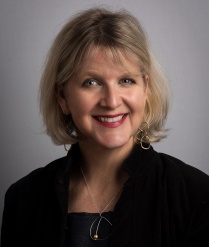
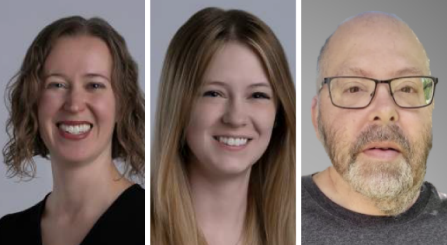
New Clinical/Teaching Faculty members Carey Dowling (left), Kimberly James (center) and Scott Wersinger (right). Christina Perazio was not photographed.
Clinical/Teaching Faculty
Our Clinical/Teaching Faculty focuses on top-notch instruction of undergraduates in psychology. They engage students in courses throughout our undergraduate curriculum, from first-year seminars to core foundational courses to special topics courses.
They also play a critical role in the administration of the undergraduate program, including directing programs, chairing departmental committees, coordinating assessments, and promoting high-quality teaching practices. Many of our Clinical/Teaching faculty conduct research, generate new knowledge about teaching or investigate scientific questions with psychology students as co-authors.
We welcomed four new Clinical/Teaching Faculty members to our department at the start of the fall semester. Carey Dowling will teach our large Clinical Psychology classes, including Psychopathology and Developmental Psychology, as well as Psychological Statistics. Kimberly James will teach UB Seminar classes to new UB students, including a course she developed intriguingly called Brains! The Neuroscience of Zombies. Christina Perazio will split her time between UB Seminar courses and large Cognitive Psychology classes, including Sensory Processes and Perception. Scott Wersinger will be splitting his time between UB Seminar courses and Biopsychology.
Two of these new instructors – Kimberly James and Scott Wersinger – are already collaborating to provide 199 students with some exciting experiential learning. Students will have the opportunity to take guided tours of UB’s Brain Museum and participate in small neuroanatomy workshops (dissecting sheep brains). Kim and Scott hope this will springboard into a mini-brain fair where 199 students will research a brain region and present posters to other 199 students.
The genetics of addiction…
The Meyer lab used rats to identify genes involved in cocaine addiction and relapse. They found that changing the activity of a gene involved in regulating the connection between brain cells can reduce cocaine intake and craving.
The key to happiness?
The Park Lab is examining people’s theories about how happiness works. People who think happiness is fleeting (so you should live in the moment) are psychologically better off than people who think of happiness as something you work at.
Learning a new language?
Research from the Pfordresher lab suggests music lessons can help! People with musical training — whether instrumental or vocal — are better at imitating pitch, which can help them learn tonal languages like Mandarin that rely on inflection to communicate meaning.
Man’s biggest friends…
The Mercado lab investigates whales' cognitive control of song production and their ability to improvise vocally. So far, several whales have been able to precisely sequence song sounds from simple to complex, and they even seem to do this in coordination with singing partners. This shows that whales, like young children, can flexibly choose what to sing when!
Is it better to intervene at home?
The Hawk lab is currently advocating for more research to examine the benefits/costs of delivering clinical interventions to people in their homes. They hope such research can reveal whether at home intervention helps or hurts traditionally underrepresented groups (e.g., racial and ethnic minoritized groups, residents of rural areas).
Managing cancer symptoms…
Research from the Ashare lab is investigating structural factors, like income, race and neighborhood, that can make it more difficult for people to get access to the types of cannabis products that can best manage cancer-related symptoms.
As part of our ongoing efforts to strengthen department inclusiveness and reach, we hosted 3 VITAL scholars for a week in October 2023. The Visiting Future Faculty (VITAL) program is the Office of Inclusive Excellence initiative. This program was developed to support the career development of young scholars from historically underrepresented backgrounds. While on campus, our visiting scholars participated in academic activities, professional development sessions, received mentorship, and toured UB and the city of Buffalo. They also met with students, faculty, and staff in our department and gave talks on their research. Olutosin (Tosin) Adesogan (University of Georgia) discussed factors associated with risk and resilience in rural Black communities; Adelis Cruz (Texas A&M University) discussed the neurobiological mechanisms of addiction-related processes using rodent models; Arturia Melson-Silimon (University of Georgia) discussed experiences of discrimination and prejudice among employees with marginalized identities.
The department also funds an annual Diversity, Equity, and Inclusion (DEI) Grant Program. These grants support undergraduate and graduate students on projects and activities that enhance inclusiveness in the field of psychological science. For the 2022-2023, we were able to fund six students. This included three research projects and assistance to three students to present at academic conferences. If you would like to support this program, we would welcome your donation.
The opioid overdose crisis is no longer in the headlines, but that doesn’t mean it has gone away. In fact it’s getting worse, with more deaths every year. The nature of the crisis is also shifting, as deaths are now rising fastest among minority communities. We are in dire need of solutions to the crisis that address what scholars call “the social determinants of health,” i.e., the social stratifications and inequalities put some communities at higher health risks than others, and that transform individual risks into public health crises.
To address this need, a group of faculty experts in the College of Arts and Sciences, Medicine and Biomedical Sciences, Public Health, Nursing, Law, Social Work, and Education to develop a new MA program called “Drugs, Health and Society.” Most academic work in the addictions space is housed in the sciences—in biomedicine, or psychology, or treatment. Our new program is unique in that it is truly multidisciplinary. The goal is to train the next generation of experts in all aspects of drugs and addiction as a scientific, social and political problem, so that we can address the overall social crisis as well as the individuals harmed by it.
New Faculty Profiles:
Federica Bulgarelli
The newly established Buffalo Early Learning Lab, directed by Dr. Federica Bulgarelli, studies how learning in infants is shaped by what they experience. Ongoing research in the lab asks exciting questions about how young infants learn from older children (such as their siblings) or from multiple talkers. Research in the lab is enjoyable for researchers and participants alike, as it involves looking at pictures on screens or playing with toys in our playroom. We can’t learn more about language development without families graciously taking the time to help us, so if you or someone you know may be interested in hearing about research opportunities for infants and children, sign up below.
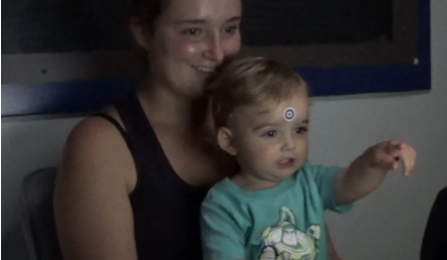
Picture of Harrison, courtesy of Krista
Psi Chi
The UB chapter of Psi Chi, the International Honor Society in Psychology, was again awarded a Model Chapter Award for the 2022-23 academic year, our third year in a row! Every year, only 30 some chapters receive this award out of the +1,000 chapters around the globe.
Highlights for this year include:
- The semesterly research fair
- A presentation from the Career Design Center about careers in psychology
- A mental health management informational
- Halloween Scavenger Hunt
- Yoga night
- The 4th annual Western New York (WNY) Undergraduate Psychology Conference
- Inducting 64 new Psi Chi members!
If you want to learn more about our events, you can frequently find us featured in Psi Chi Headquarters’ “Eye on Psi Chi” digital magazine.
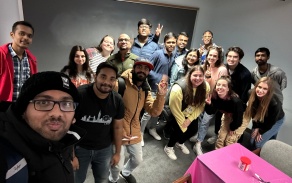
Various UB students at a joint Psi Chi and Undergraduate Psychology Association (UPA) social event.
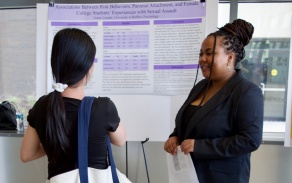
UB student Joame Lissade (right) is presenting her poster at the 4th annual Western New York Undergraduate Psychology Conference.
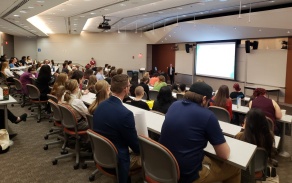
A rapt audience at the 4th annual Western New York Undergraduate Psychology Conference is listening to RIT student Finn Cohen (standing) giving an oral presentation.
Our Recent Honorees
The generous gifts of alumni and department friends allow us to honor the scholarly contributions of our accomplished undergraduate and graduate students.
Aria Wiseblatt and Julian Livingston are the 2023 graduate and undergraduate recipients of the Murray Levine Award for Community Engagement in Psychology. Dr. Murray Levine was a SUNY Distinguished Service Professor and a member of the UB Psychology Department from 1968 until 2000. Murray was among a core group of influential psychologists who helped launch the field of community psychology. This award recognizes original research poised to make a significant impact on the community surrounding UB and is sponsored by the generous support of Dr. Robert Fink, a UB alumnus and one of Murray’s former students.
Aria Wiseblatt was honored for her paper titled “Do risk factors for incapacitated and other sexual assault differ for Black and White college women?” Aria is conducting focus groups with Black college women from the greater Buffalo area to better understand their experiences with sexual risk, as well as the ways in which they protect themselves and each other.
Julian Livingston was honored for his countless hours of service to the UB community. Julian is a McNair Scholar, and has worked as an undergraduate research assistant in two laboratories. Julian serves as a UB First-Generation Peer Mentor and as a resident advisor for the gender-inclusive community. In addition, he is an active member of the UB Alliance Community Committee, which works to advocate for, and empower, the LGBTQ+ community at UB, and participated in several community engagement trips, including the UB-sponsored Poverty Alleviation Community Service trip.
Sarah Honeycutt is the 2023 Robert W. Rice Memorial Award for Early Excellence in Research recipient. Dr. Rice joined the UB Psychology department in 1976 and furthered his research examining quality of work and family life. The award in his name honors distinguished early career research contributions by a junior graduate student. Sarah received this award for her 2022 paper, titled “Acute nicotine treatment enhances compulsive-like remifentanil self-administration that persists despite contextual punishment,” published in "Addiction Biology."
Alexis Harrell is the 2023 recipient of the Feldman-Cohen Award. Named in honor of two distinguished former faculty, the award is given to the undergraduate whose Honors Thesis receives the highest ranking by the student’s examination committee, faculty advisor, and the Director of the Honors Program. Alexis’s thesis investigated psychological factors that can lead people to disengage from social movements like Black Lives Matter.
Rachael Shaw is the 2023 recipient of the Bugelski Dissertation Award. The award honors excellence in scholarly productivity during doctoral studies and the significance and quality of the doctoral dissertation project. Rachael received this award for her dissertation research on the effect of alcohol use on expression of consent during sexual encounters in college women. This award is supported by an endowment in the honor of Dr. B. R. Bugelski, a UB Distinguished Professor of Psychology and Chair of our department in the 1960s. Dr. Bugelski was best known for the advancement of the concept of "secondary reinforcement," an idea that has become a core concept in learning theory and appears in many psychology textbooks.
Alumni Awards
We are proud and happy to report that the Society of Personality and Social Psychology recently honored two graduates of our PhD program in Social Psychology. Veronica Lamarche received the Sage Early Career Trajectory Award and Brooke Feeney received the Diener Award in Social Psychology.
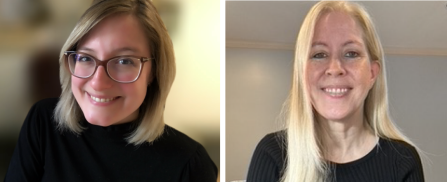
Veronica Lamarche (left) and Brooke Feeney (right)
Thank you for your support of the Department of Psychology. With the support of alumni and friends, we can provide vital resources to enhance our department and provide support for students, research projects and programs. We are grateful for your generosity.
You can support your department and help to provide for our students by making a gift online.